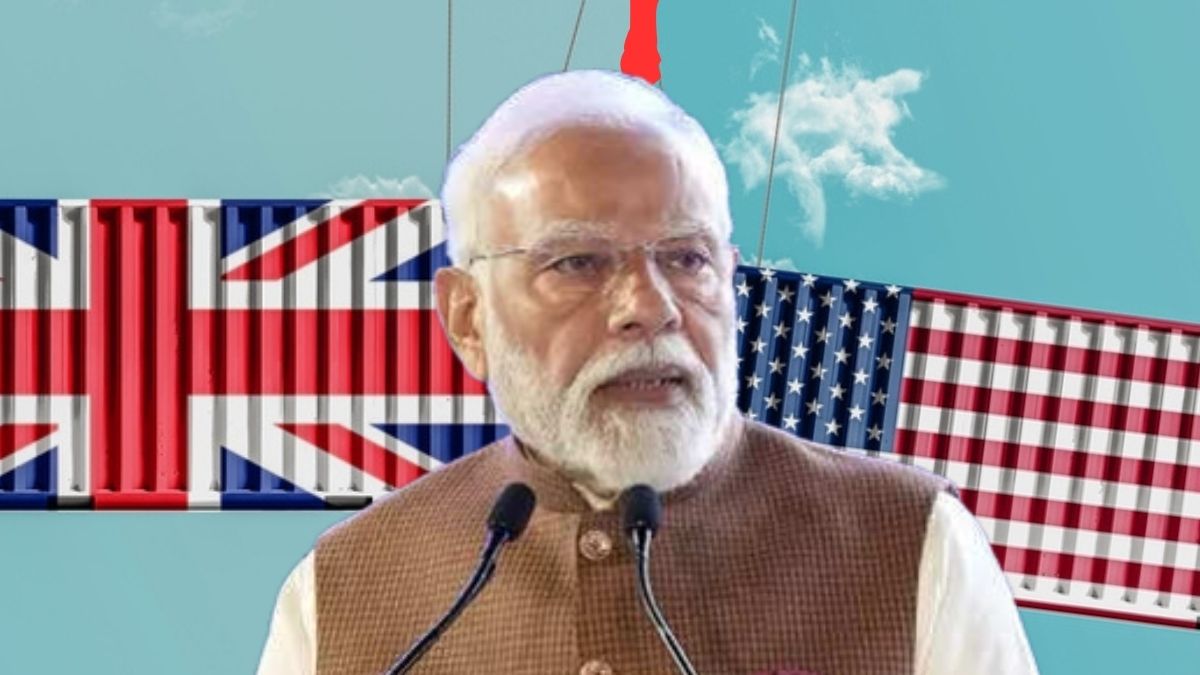Will the UK FTA help India tide over Trump tariffs? Exploring the impact on pharma, textiles, electronics, and more
 Representative graphic | Shutterstock/PTI
Representative graphic | Shutterstock/PTI
For India, bilateral trade negotiations have become more important than ever. Our economy is in a unique position—we are facing a significant new challenge and an opportunity, at the same time.
It all started with India’s largest trading partner, the United States of America, announcing a sweeping 25% tariff on all Indian goods. In parallel, India also signed a historic Free Trade Agreement (FTA) with the United Kingdom, expected to come into effect in phases. While the first one makes Indian products more expensive in the American market, the latter will eliminate taxes on most Indian exports to the UK.
So, how much of India’s exports are impacted, and what does this new trade reality mean for key Indian industries and the common person?
The two sides of the coin
The US challenge: A tariff is a tax imposed by a country on imported goods. The new 25 per cent US tariff means that for every ₹100 worth of goods an Indian company sends to the US, the American importer will have to pay an additional ₹25 in tax. This cost is usually passed on to the American consumer, making the Indian product more expensive compared to similar items from countries not facing the tariff, like Mexico and Vietnam—or even China. This could lead to a sharp drop in orders for Indian factories.
MORE | FACT CHECK: New Delhi to modify India-US bilateral agreements after Trump's 25% tariff? Here's the truth
The UK opportunity: A free trade deal does the opposite. The India-UK FTA is expected to remove British tariffs on over 99 per cent of Indian goods. This means our products would become cheaper and more competitive in the UK market. For instance, a 12 per cent tariff on Indian textiles will be cut to zero, giving Indian sellers a major price advantage.
So, how does this ‘coin’ of trade impact the major Indian export sectors?
Electronics and smartphones
The US tariffs are a major blow to the “Make in India” initiative. India has become a significant exporter of smartphones, with major global brands manufacturing here (like Apple and Samsung) for export. The 25 per cent tariff would instantly erase the cost competitiveness of these Indian-made phones in the US market, likely causing a severe drop in exports.
The Ministry of Commerce and Industry’s monthly reports in the coming quarter would give us a better idea of the impact.
MORE | Trump tariffs: Undeterred India to continue buying Russian oil
However, the UK FTA—once it comes into effect—would reduce tariffs on Indian electronics in the UK, opening up a new and valuable market. But the volume of smartphone and electronics exports to the US is currently far larger than to the UK, which means it cannot immediately compensate for the potential losses from the massive US market.
Textiles and apparel
The US has been the single largest buyer of Indian apparel and home textiles. A 25 per cent tariff will make our clothing much more expensive for US brands and consumers. This poses a direct threat to millions of jobs in textile hubs like Tiruppur, Ludhiana, and Panipat. Data from the Apparel Export Promotion Council (AEPC) of India in the coming months would provide a better insight into the same.
Here is where the UK FTA is a game-changer. The free trade deal essentially eliminates the existing UK tariffs (currently 8-12 per cent) on Indian textiles and apparel, giving our exporters a significant edge over competitors like Bangladesh (which already had duty-free access) and China. This could potentially offset a significant portion of the losses from the US tariffs over time.
Gems and jewellery
This sector, which employs millions in cities like Surat and Jaipur, sends a huge portion of its exports to the US. A 25 per cent tariff on items like cut diamonds and gold jewellery is exceptionally damaging, as margins in this trade are sensitive to price changes. Demand from the US is likely to fall sharply. The UK FTA impact on this is unclear, but the sheer scale of the US market for gems and jewellery means that the industry would face a very challenging period ahead.
Pharmaceuticals
India is known as the “pharmacy of the world” and is a critical supplier of affordable generic medicines to the US. While essential medicines could get more exemptions from tariffs, if Trump doubles down, it would lead to healthcare costs jumping for American citizens. Trump’s April tariff set excluded essential pharma products, but the latest flat tariffs would impact the US more than India.
The UK FTA presents India with a stable new market with a 0 per cent tariff. But it is significantly small, but it is a good change.
Many industry experts, especially in pharma, are not overtly worried about the US tariffs. The UK FTA is timely and crucial to the economy as well, giving Indian exporters a way to diversify away from the US market—especially for sectors like textiles.
Yet, the UK economy is significantly smaller than that of the US. As export numbers come in over the next quarter, the impact of the US tariffs will become clearer.
Business